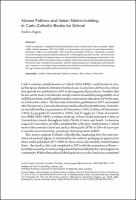Chapter Absent Fathers and Italian Nation-building in Carlo Collodi’s Books for School
| dc.contributor.author | Pagani, Andrea | |
| dc.date.accessioned | 2022-09-15T20:08:07Z | |
| dc.date.available | 2022-09-15T20:08:07Z | |
| dc.date.issued | 2022 | |
| dc.identifier | ONIX_20220915_9788855185974_118 | |
| dc.identifier.issn | 2420-8361 | |
| dc.identifier.uri | https://library.oapen.org/handle/20.500.12657/58322 | |
| dc.description.abstract | In this contribution, I analyse the schoolbooks of Carlo Collodi (born Carlo Lorenzini, 1826-1890), written between 1877 and 1890. In those years, the recently formed Italian State – declared in 1861 and completed in 1871 with the annexation of Rome – faced the necessity of constructing a shared national identity for a heterogeneous community. I examine how the representation of paternal figures is informed by Collodi’s pedagogical approach in his schoolbooks. Within the Italian nation-building, which had cultural and ideological nuances, the family was considered essential, and the padre played an undisputed authoritarian role. However, my analysis demonstrates how Collodi’s schoolbooks subvert that ideology through representing the dysfunctional paternal figure. | |
| dc.language | English | |
| dc.relation.ispartofseries | Biblioteca di Studi di Filologia Moderna | |
| dc.subject.classification | thema EDItEUR::D Biography, Literature and Literary studies | en_US |
| dc.subject.other | Collodi | |
| dc.subject.other | Italian Identity | |
| dc.subject.other | Nation-building | |
| dc.subject.other | Nineteenth Century | |
| dc.subject.other | Pinocchio | |
| dc.title | Chapter Absent Fathers and Italian Nation-building in Carlo Collodi’s Books for School | |
| dc.type | chapter | |
| oapen.identifier.doi | 10.36253/978-88-5518-597-4.06 | |
| oapen.relation.isPublishedBy | bf65d21a-78e5-4ba2-983a-dbfa90962870 | |
| oapen.relation.isbn | 9788855185974 | |
| oapen.series.number | 66 | |
| oapen.pages | 18 | |
| oapen.place.publication | Florence |

